
AIX is a series of proprietary Unix operating systems developed and sold by IBM for several of its computer platforms.
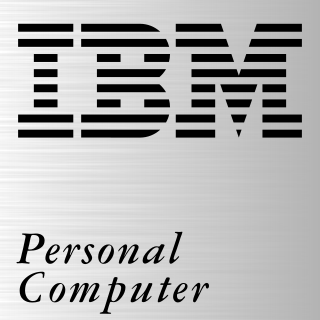
The IBM Personal Computer is the first microcomputer released in the IBM PC model line and the basis for the IBM PC compatible de facto standard. Released on August 12, 1981, it was created by a team of engineers and designers directed by Don Estridge in Boca Raton, Florida.

Lotus 1-2-3 is a discontinued spreadsheet program from Lotus Software. It was the first killer application of the IBM PC, was hugely popular in the 1980s, and significantly contributed to the success of IBM PC-compatibles.
XyWrite is a word processor for MS-DOS and Windows modeled on the mainframe-based ATEX typesetting system. Popular with writers and editors for its speed and degree of customization, XyWrite was in its heyday the house word processor in many editorial offices, including the New York Times from 1989 to 1993. XyWrite was developed by David Erickson and marketed by XyQuest from 1982 through 1992, after which it was acquired by The Technology Group. The final version for MS-DOS was 4.18 (1993); for Windows, 4.13.
Taligent was an American software company. Based on the Pink object-oriented operating system conceived by Apple in 1988, Taligent Inc. was incorporated as an Apple/IBM partnership in 1992, and was dissolved into IBM in 1998.
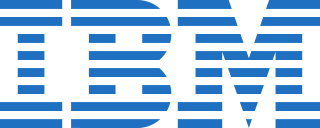
The AIM alliance, also known as the PowerPC alliance, was formed on October 2, 1991, between Apple, IBM, and Motorola. Its goal was to create an industry-wide open-standard computing platform based on the POWER instruction set architecture. It was intended to solve legacy problems, future-proof the industry, and compete with Microsoft's monopoly and the Wintel duopoly. The alliance yielded the launch of Taligent, Kaleida Labs, the PowerPC CPU family, the Common Hardware Reference Platform (CHRP) hardware platform standard, and Apple's Power Macintosh computer line.
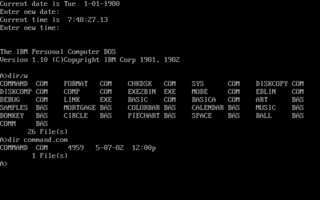
IBM PC DOS, an acronym for IBM Personal Computer Disk Operating System, is a discontinued disk operating system for IBM PC compatibles. It was manufactured and sold by IBM from the early 1980s into the 2000s. Developed by Microsoft, it was also sold by that company as MS-DOS. Both operating systems were identical or almost identical until 1993, when IBM began selling PC DOS 6.1 with new features. The collective shorthand for PC DOS and MS-DOS was DOS, which is also the generic term for disk operating system, and is shared with dozens of disk operating systems called DOS.

Wang Laboratories was a computer company founded in 1951, by An Wang and G. Y. Chu. The company was successively headquartered in Cambridge, Massachusetts (1954–1963), Tewksbury, Massachusetts (1963–1976), and finally in Lowell, Massachusetts (1976–1997). At its peak in the 1980s, Wang Laboratories had annual revenues of $3 billion and employed over 33,000 people. It was one of the leading companies during the time of the Massachusetts Miracle.
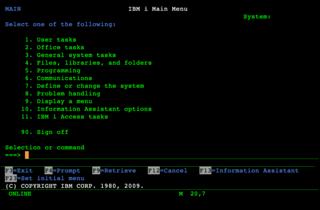
IBM i is an operating system developed by IBM for IBM Power Systems. It was originally released in 1988 as OS/400, as the sole operating system of the IBM AS/400 line of systems. It was renamed to i5/OS in 2004, before being renamed a second time to IBM i in 2008. It is an evolution of the System/38 CPF operating system, with compatibility layers for System/36 SSP and AIX applications. It inherits a number of distinctive features from the System/38 platform, including the Machine Interface, the implementation of object-based addressing on top of a single-level store, and the tight integration of a relational database into the operating system.
Peter Norton is an American programmer, software publisher, author, and philanthropist. He is best known for the computer programs and books that bear his name and portrait. Norton sold his software business to Symantec Corporation in 1990.
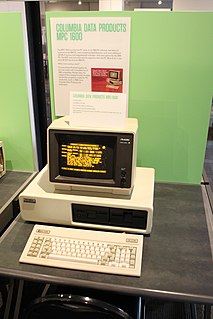
Columbia Data Products (CDP) is a company which produced the first legally reverse-engineered IBM PC clones. It faltered in that market after only a few years, and later reinvented itself as a software development company.

Louis Vincent "Lou" Gerstner Jr. is an American businessman, best known for his tenure as chairman of the board and chief executive officer of IBM from April 1993 until 2002, when he retired as CEO in March and chairman in December. He is largely credited with turning IBM's fortunes around.

Samuel J. "Sam" Palmisano is a former president and the eighth chief executive officer of IBM until January 2012. He also served as Chairman of the company until October 1, 2012.

PC Magazine is an American computer magazine published by Ziff Davis. A print edition was published from 1982 to January 2009. Publication of online editions started in late 1994 and continues to this day.

Phillip ("Phil") Doyce Hester was an American engineer and technology executive.
This article presents a timeline of events in the history of 16-bit x86 DOS-family disk operating systems from 1980 to present. Non-x86 operating systems named "DOS" are not part of the scope of this timeline.

Mark D. Papermaster is an American business executive currently serving as the chief technology officer (CTO) and executive vice president for Technology and Engineering at Advanced Micro Devices (AMD). On January 25, 2019 he was promoted to AMD's Executive Vice President. Papermaster previously worked at IBM from 1982 to 2008, where he was closely involved in the development of PowerPC technology and served two years as vice president of IBM's blade server division. Papermaster's decision to move from IBM to Apple Inc. in 2008 became central to a court case considering the validity and scope of an employee non-compete clause in the technology industry. He became senior vice president of devices hardware engineering at Apple in 2009, with oversight for devices such as the iPhone. In 2010 he left Apple and joined Cisco Systems as a VP of the company's silicon engineering development. Papermaster joined AMD on October 24, 2011, assuming oversight for all of AMD's technology teams and the creation of all of AMD's products, and AMD's corporate technical direction.
William Cleland Lowe was an IBM Executive and is known as one of the "Fathers of the IBM PC".

The Palm Top PC 110 is a handheld personal computer that was developed jointly by IBM's Japanese subsidiary and Ricoh. It was released exclusively in Japan in September 1995. It used the Intel 80486SX microprocessor and was available in three different configurations. It used a Japanese keyboard, could be used in a docking station, and had a modem connection. During the development phase, the size was decreased. After the release, it was received positively for the number of features, but negatively for the small keyboard.












